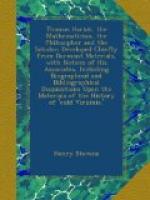We find no hint of any opposition in England to these French colonizing schemes, but on the contrary they were looked upon as an advantageous barrier to Spanish greed of territorial extension northward under the vicegerent’s gift. There are still existing hints of English projects of western voyages at this time, about the year 1565, to the American coast. Elizabeth, however, was friendly to the Huguenots, and evinced great sympathy with their Florida colonial scheme. England’s claim to Newfoundland and Labrador, through discovery by the Cabots, had been allowed to lapse chiefly from the Protestant doctrine of non-occupation. The French occupation of Canada was not disputed. There was some doubt, however, about the intermediate country between the New France of Canada and the New France of Florida, and hence we find that private plans of English occupation were hatching at this early period, but they were not encouraged. This delicate question between France and Spain was, however, soon settled by the well known course of events with which England had nothing to do but to stand aside till the contest was over, and then in due course of time, like an independent powerful neutral, step in and reap the rewards.
It is well known that Laudonnière’s followers were not altogether harmonious. Some restless spirits seceded, and seizing one of the colony’s ships, entered successfully in the autumn and winter of 1564-65 into piracy on the rich commerce of Spain in the West Indies. These French spoliations had been a sore point with the owners of West India commerce since the days of Verrazano, so much so that the Spanish Government had instituted a fleet of coastguards among the islands to intercept and destroy the pirates. This fleet for some time had been under the charge of an experienced, trusted, and efficient officer named Pedro Menendez de Avilés. No doubt the provocation was great, and the new piracy was not to be endured. The home government of Spain had been kept informed of the Huguenot encroachments in Florida, a country which had long ago been granted to Ponce de Leon, Ayllon and others, and had been coasted by Estevan Gomez, but these encroachments had hitherto been so long winked at that the French colonists began to feel themselves to be in tolerable security.
French piracy and Calvinism, however, coming together were two provocations too much for the patriotism and piety of the zealous Roman Catholic Spanish commander in the West Indies. Besides, there was a sorrow which roused his Spanish bigotry and induced him more than ever to serve God and his king by exterminating heresy. Don Pedro, with his new honors and high hopes, had left Cadiz on the 31st of May 1564, as Captain-General of the West India, the Terra Firma, the Peruvian, and the New-Spain fleets, his son under him commanding the ships to Vera Cruz. This son on the homeward voyage in the autumn had been lost on the rocks of Bermuda. This circumstance, with the Florida pirates, the heretic French and his Spanish love of barbaric gold, fired his zeal.




